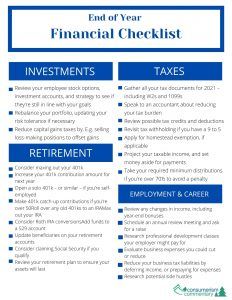
2020 Year End Financial Check List: Check Your Finances And Act
The end of the year is the perfect time to review and reflect. That goes for finances too. Your mind may be on Thanksgiving and Christmas, but spending some quality time with your accounts can set you up for an even better year ahead. To help you out, we’ve put together an end of year financial checklist.
Some things on this list are time-specific – things you really need to do before the ball drops in Times Square. Others aren’t necessarily. But a regular review could help you avoid penalties, save money, and reduce your tax burden.
So take your eye off the turkey and let’s get started.
Investments
- Review your employee stock options, investment accounts, and strategy to see if they’re still in line with your goals
- Rebalance your portfolio, updating your risk tolerance if necessary
- Reduce capital gains taxes by, E.g. selling loss-making positions to offset gains
Retirement
- Consider maxing out your 401k
- Increase your 401k contribution amount for next year
- Open a solo 401k – or similar – if you’re self-employed
- Make 401k catch-up contributions if you’re over 50
- Roll over any old 401ks to an IRA
- Max out your IRA
- Consider Roth IRA conversions
- Add funds to a 529 account
- Update beneficiaries on your retirement accounts
- Consider claiming Social Security if you qualify
- Review your retirement plan to ensure your assets will last
Taxes
- Gather all your tax documents for 2021 – including W2s and 1099s
- Speak to an accountant about reducing your tax burden
- Review possible tax credits and deductions
- Revisit tax withholding if you have a 9 to 5
- Apply for homestead exemption, if applicable
- Project your taxable income, and set money aside for payments
- Take your required minimum distributions if you’re over 70½ to avoid a penalty
Employment and Career
- Review any changes in income, including year-end bonuses
- Schedule an annual review meeting and ask for a raise
- Research professional development classes your employer might pay for
- Evaluate business expenses you could cut or reduce
- Reduce your business tax liabilities by deferring income, or prepaying for expenses
- Research potential side hustles
Health / Insurance
- Review your life insurance
- Review your homeowner’s or renter’s insurance
- Update your auto insurance
- Review and update any business insurance
- Review your healthcare insurance
- Sign up for Medicare if you qualify
- Look over long-term and short-term disability insurance, if applicable
- Max out your HSA account
- Submit receipts for FSA account reimbursement, or roll over funds if allowed
Family
- Update and review beneficiaries
- Establish a custodial savings account for your children
- Plan out gifts for loved ones
- Make charitable contributions – cash or other assets – and gather the documents you’ll need to itemize deductions
- Create or review estate planning documents such as a living will, last will and testament, and power of attorney
- Create or review a “just in case” document should your family need your financial information
Credit Health / Debt / Savings
- Review last year’s financial goals. Were you able to save for major life events? Did you stick to your budget?
- Set financial goals for the next 12 months
- Create a buffer in your checking account
- Check your short-term saving progress. Are your vacation and emergency funds on track?
- Open a high-interest savings account to grow your short-term savings
- Set up recurring deposits for long-term and short-term savings goals
- Review your debt repayment progress
- Check if you’ve repaid enough to qualify for refinancing
- Check your credit score. Plan how to improve it
- Dispute any errors on your credit report. Check for free at AnnualCreditReport.com
- Sign up for an ID monitoring service
The list may seem a long one, but you don’t have to do everything at once. Bookmark this page – or even better, download the year-end financial checklist now – and tick off each task as you complete them. If you print it out and leave it somewhere your family can see, they can also keep you on track.
And you needn’t do it all yourself. You could share the load by delegating tasks. For instance, your spouse could gather paperwork while you look over estate planning documents. Or a financial professional like a CPA or financial planner could do a lot of the legwork for you.
However you decide to approach it, you’ll be glad you did. It’s not just your house that needs a spring cleaning.



Article comments
Thanks for this update. The end of the year To-Dos are overwhelming, but your list is helpful in breaking it down.